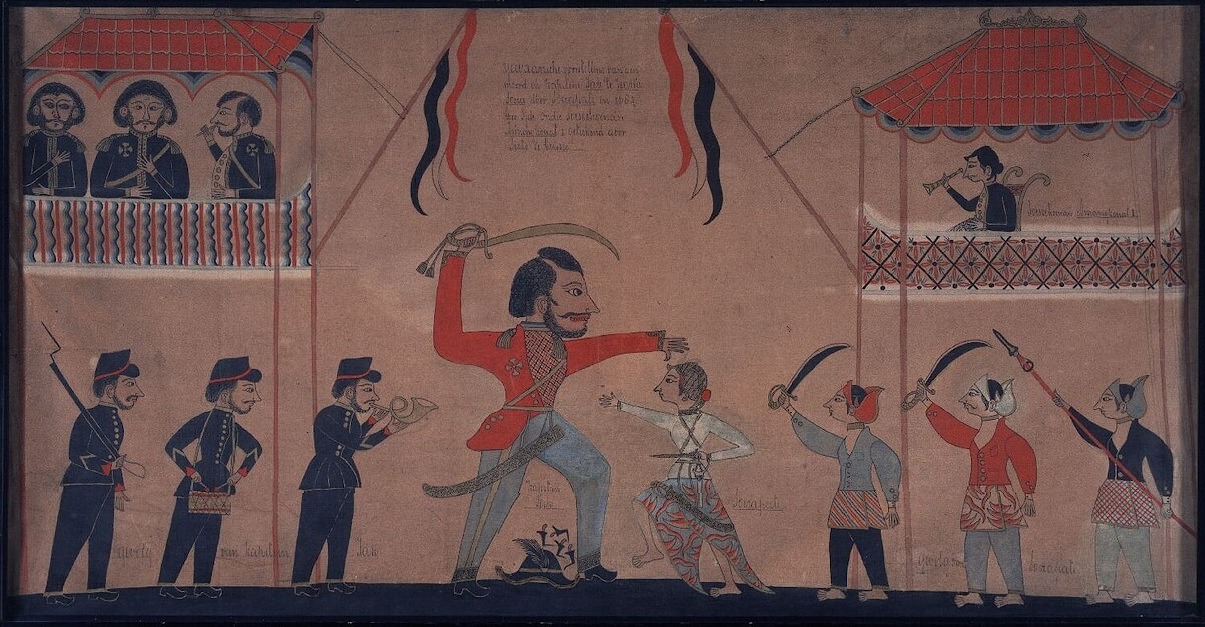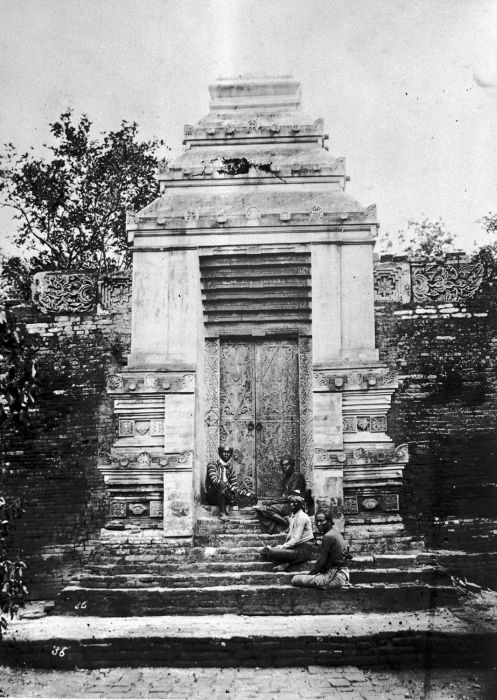|
Untung Surapati
Untung Suropati also Untung Surapati (1660 – December 5, 1706) was an Indonesia war fighter who led a few rebellions against the Dutch East India Company (VOC). Some of his exploits were written in Babad Tanah Jawi. Early life Surapati was born Surawiraaji, a Balinese. According to Buleleng sources he was the son of the general for kingdom of Swecalinggarsa-pura Gelgel. After some conflict, his father alongside loyal followers sought refuge in Marga Tabanan village. Surapati, at the time four years old, was separated from the entourage when crossing Ayung river. He was bought by VOC Captain van Beber in Bali market. Surapati then lived as a slave in Batavia, the headquarters of the VOC (now Jakarta). He was then sold to other VOC officials, until he was eventually bought by ''edeleer'' Moor, which gave him the nickname "Untung" ( lucky) because his career and fortune improved after acquiring him. He began a relationship with Moor's daughter Suzanne and had a son, Robert ... [...More Info...] [...Related Items...] OR: [Wikipedia] [Google] [Baidu] |
Regency (Indonesia)
A regency ( id, kabupaten), sometimes incorrectly referred to as a district, is an administrative division of Indonesia, directly under a province and on the same level with city (''kota''). Regencies is divided into districts (''Kecamatan'', ''Distrik'' in Papua region, or ''Kapanewon'' in the Special Region of Yogyakarta). The English name "regency" comes from the Dutch colonial period, when regencies were ruled by ''bupati'' (or regents) and were known as ''regentschap'' in Dutch (''kabupaten'' in Javanese and subsequently Indonesian). ''Bupati'' had been regional lords under the precolonial monarchies of Java. When the Dutch abolished or curtailed those monarchies, the bupati were left as the most senior indigenous authority. They were not, strictly speaking, "native rulers" because the Dutch claimed full sovereignty over their territory, but in practice, they had many of the attributes of petty kings, including elaborate regalia and palaces and a high degree of impunity. Et ... [...More Info...] [...Related Items...] OR: [Wikipedia] [Google] [Baidu] |
François Tack
François Tack (c. 1650 – 8 February 1686) was a Dutch East India Company (VOC) officer. Ranked captain at the time of his death, he was one of the VOC's main commanders during the 1678 Kediri campaign against Trunajaya and participated in the city's assault. He was later killed during a brawl at the court of Mataram in Kartasura on 8 February 1686, where he was sent on a diplomatic mission. See also * Anthonio Hurdt, the overall VOC commander of the Kediri campaign. * Isaac de Saint-Martin Isaac de l'Ostal de Saint-Martin (or Lostal) (c. 1629 – 14 April 1696) was a French chevalier, who came in an unknown year from the Béarn to the Dutch Republic. Life In 1657 he left for Batavia, after a training in the Dutch States Army, ... References Bibliography * * * {{Authority control Dutch East India Company people 1686 deaths Year of birth uncertain ... [...More Info...] [...Related Items...] OR: [Wikipedia] [Google] [Baidu] |
Semarang
Semarang ( jv, ꦏꦸꦛꦯꦼꦩꦫꦁ , Pegon: سماراڠ) is the capital and largest city of Central Java province in Indonesia. It was a major port during the Dutch colonial era, and is still an important regional center and port today. The city has been named as the cleanest tourist destination in Southeast Asia by the ASEAN Clean Tourist City Standard (ACTCS) for 2020–2022. It has an area of and is located at . The population of the city was 1,555,984 at the 2010 censusBiro Pusat Statistik, Jakarta, 2011. and 1,653,524 at the 2020 census,Badan Pusat Statistik, Jakarta, 2021. making it Indonesia's ninth most populous city after Jakarta, Surabaya, Bekasi, Bandung, Medan, Depok, Tangerang and Palembang. The built-up urban area had 3,183,516 inhabitants at the 2010 census spread over two cities and 26 districts. The Semarang metropolitan area (a.k.a. ''Kedungsepur'') has a population of over 6 million in 2020 (''see Greater Semarang section''). The population of the cit ... [...More Info...] [...Related Items...] OR: [Wikipedia] [Google] [Baidu] |
Patih
Vicegerent is the official administrative deputy of a ruler or head of state: ''vice'' (Latin for "in place of") and ''gerere'' (Latin for "to carry on, conduct"). In Oxford colleges, a vicegerent is often someone appointed by the Master of a college to assume their powers and responsibilities during a period of absence. Usage Catholic Church In the Catholic Church, the Vicegerent is an auxiliary bishop of the Diocese of Rome, who is granted the personal title of archbishop and serves as the chief assistant to the Cardinal Vicar of Rome. Church of England Early in 1535, closely following the passing of Parliament's Act of Supremacy formally creating the Church of England, King Henry VIII appointed his chief minister Thomas Cromwell "Vice-Gerent in spirituals", effectively acting as the king's deputy in church matters and taking precedence over the two archbishops; this was a necessary step as Cromwell, as an unordained layman, otherwise had no jurisdiction within the Chur ... [...More Info...] [...Related Items...] OR: [Wikipedia] [Google] [Baidu] |
Susuhunan
Susuhunan, or in short version Sunan, is a title used by the monarchs of Mataram and then by the hereditary rulers of Surakarta, Indonesia. Additionally in Bali and Yogyakarta, so-called " Kings of kings" reigned with this title, while their kingdoms were called "Sunanates". The name Susuhunan is also used as a romantic nickname for loved ones, but also for highly respected public figures. Lovers or mistresses were also referred to with this nickname outside in private. The abbreviation Sunan is also used as a given name. Names and titles The full title of the Susuhunan in Javanese is: ''Sampeyan Dalem ingkang Sinuhun Kanjeng Susuhunan Prabhu Sri Paku Buwana Senapati ing Alaga Ngabdulrahman Sayidin Panatagama'' (" His Exalted Majesty, The Susuhunan, King Paku Buwana, Commander in the field of battle, Servant of the Most Gracious, the regulator of Religion"). This long title is occasionally abbreviated in media with Latin texts as SISKS, denoting ''Sampeyan dalem Ingkang Sinu ... [...More Info...] [...Related Items...] OR: [Wikipedia] [Google] [Baidu] |
Kedu Plain
Kedu Plain, also known as Progo River valley, is the fertile volcanic plain that lies between the volcanoes Mount Sumbing and Mount Sundoro to the west, and Mount Merbabu and Mount Merapi to the east. It roughly corresponds to present-day Magelang and Temanggung Regency of Central Java, Indonesia. Its northern border is limited by hills of Kendal and Mount Ungaran. The plain also borders the Menoreh hills in the southwest and Prambanan Plain in the southeast. The Progo River runs through the center of this plain, from its source on the slope of Mount Sundoro to the southern coast of Java facing the Indian Ocean. It has been a significant location in Central Javanese history for over a millennium, as it contains traces of the Sailendra dynasty as well as Borobudur and associated locations. During the colonial Dutch East Indies period, the Kedu Plain was located in the Kedu Residency, which at that time covered what are now the Magelang Regency, Magelang City, and Temanggung Regency ... [...More Info...] [...Related Items...] OR: [Wikipedia] [Google] [Baidu] |
Mataram Sultanate
The Sultanate of Mataram () was the last major independent Javanese kingdom on the island of Java before it was colonised by the Dutch. It was the dominant political force radiating from the interior of Central Java from the late 16th century until the beginning of the 18th century. Mataram reached its peak of power during the reign of Sultan Agung Anyokrokusumo (), and began to decline after his death in 1645. By the mid-18th century, Mataram lost both power and territory to the Dutch East India Company (Dutch: ''Vereenigde Oost-Indische Compagnie''; ''VOC''). It had become a vassal state of the company by 1749. Etymology The name ''Mataram'' itself was never the official name of any polity, as the Javanese often refer to their realm simply as ''Bhumi Jawa'' or ''Tanah Jawi'' ("Land of Java"). ''Mataram'' refers to the historical areas of plains south of Mount Merapi around present-day Muntilan, Sleman, Yogyakarta, and Prambanan. More precisely, it refers to the Kota Gede ... [...More Info...] [...Related Items...] OR: [Wikipedia] [Google] [Baidu] |
Trunajaya Rebellion
The Trunajaya rebellion (also spelled Trunojoyo; id, Pemberontakan Trunajaya) or Trunajaya War was the ultimately unsuccessful rebellion waged by the Madurese prince Trunajaya and fighters from Makassar against the Mataram Sultanate and its Dutch East India Company (VOC) supporters in Java (in modern-day Indonesia) during the 1670s. The rebellion was initially successful: the rebels defeated the royal army at Gegodog (1676), captured most of the Javanese north coast, and took the Mataram capital Plered (1677). King Amangkurat I died during the retreat of the royal court. His son and successor, Amangkurat II, requested help from the VOC in exchange for financial remuneration and geopolitical concessions. The VOC's subsequent involvement turned the tide of the war. VOC and Mataram forces expelled Trunajaya from Surabaya, recovered lost territories and overran his new capital at Kediri (1678). However, the rebellion continued until the capture of Trunajaya at the end of 167 ... [...More Info...] [...Related Items...] OR: [Wikipedia] [Google] [Baidu] |
Makassar People
The Makassar or Makassarese people are an ethnic group that inhabits the southern part of the South Peninsula, Sulawesi (formerly Celebes) in Indonesia. They live around Makassar, the capital city of the province of South Sulawesi, as well as the Konjo highlands, the coastal areas, and the Selayar and Spermonde islands. They speak Makassarese, which is closely related to Buginese and also a Malay creole called Makassar Malay. History The Makassar are an ethnic group originally from the southern coast of the island of Sulawesi. Their exploratory spirits have led to successful overseas explorations. This is exemplified by the Kingdom of Gowa (14-17th century), which succeeded in forming a vast Islamic empire with a large and strong naval force. Its territory included almost the entire island of Sulawesi, eastern Kalimantan, East Nusa Tenggara, part of West Nusa Tenggara, part of Maluku and some small surrounding islands. The Makassar people made treaties with Bali and coopera ... [...More Info...] [...Related Items...] OR: [Wikipedia] [Google] [Baidu] |
Balinese People
The Balinese people ( id, suku Bali; ban, ᬳᬦᬓ᭄ᬩᬮᬶ, anak Bali) are an Austronesian ethnic group native to the Indonesian island of Bali. The Balinese population of 4.2 million (1.7% of Indonesia's population) live mostly on the island of Bali, making up 89% of the island's population. There are also significant populations on the island of Lombok and in the easternmost regions of Java (e.g. the regency of Banyuwangi). Origins The Balinese originated from three periods of migration. The first waves of immigrants came from Java and Kalimantan in prehistoric times and were of Proto-Malay stock. The second wave of Balinese came slowly over the years from Java during the Hindu period. The third and final wave came from Java, between the 15th and 16th centuries, about the same time as the conversion to Islam in Java, causing aristocrats and peasants to flee to Bali after the collapse of the Javanese Hindu Majapahit Empire in order to escape Mataram's Islamic conv ... [...More Info...] [...Related Items...] OR: [Wikipedia] [Google] [Baidu] |








